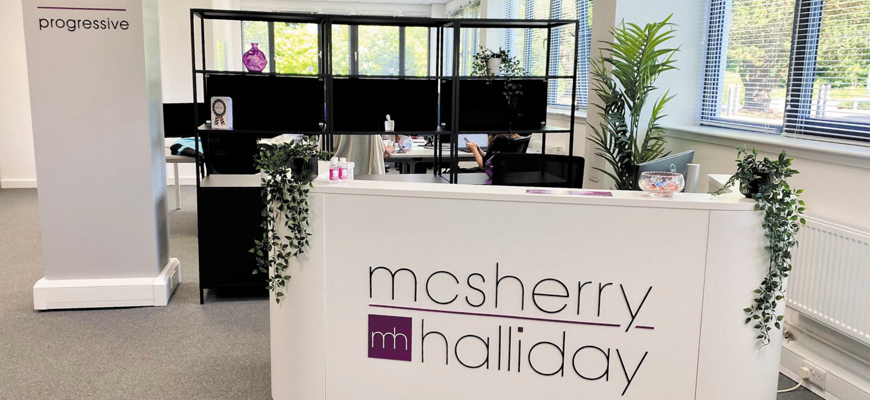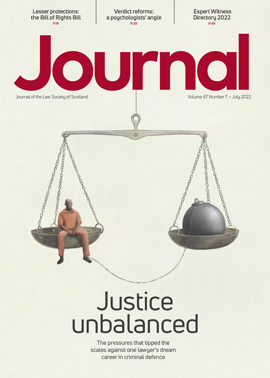High street and hybrid

Four branch offices combined into one, with too few seats for everyone at once – but a new outreach to clients across Scotland. Welcome to one high street firm’s restyled version of practice in the 2020s.
The firm is McSherry Halliday, which has just relocated its 35 strong team, previously dispersed in four offices across Ayrshire, to newly renovated premises at Elliott House, Irvine.
Except it isn’t quite that simple. The new office is fitted out with desks for just 15 staff, though the building can accommodate the firm’s expansion plans if necessary. It sends a clear signal that a practice which until the pandemic had stuck to the 9 to 5 office working day model, has fully embraced hybrid working, with staff spending maybe two days a week in the office and three at home.
COVID-19 catalyst
While planning began about a year before COVID-19 emerged, once the initial shock of lockdown had passed the enforced change began to be seen as an impetus towards the new office and as making the transition a lot easier.
“We pride ourselves in always thinking ahead of the game to develop, an example being our decision over 10 years ago to trial the remote storage of information and case management on the cloud,” partner Caroline Nisbet explains. “We have been working with this technology since then, gradually becoming paperless, to such an extent that when the pandemic forced everyone to work remotely, we were well equipped from the beginning to move our entire practice smoothly from office to homeworking. This meant that throughout the lockdown we were available to fully service all of our clients’ needs.”
Clients have equally discovered the benefits of remote working, finding it more convenient to join a video call than take a half day’s leave for an in-person appointment.
Though a traditional high street practice, taking on most types of work apart from criminal law, McSherry Halliday was already finding ahead of COVID-19 that the digital side could be a good way to grow the business. Even so, the pandemic proved a catalyst to realising just how effective it could be – which helped reinforce the intention to move everything under one roof.
New business recently has been coming primarily through its website and other digital means. As a result, clients are coming from a wider area. And associate Louisa Doole, who now lives in Edinburgh, is able to manage a caseload that covers not only Ayrshire clients but the whole of Scotland. “This has shown that hybrid working has enabled us to expand and thrive. I don’t think anyone realised how progressive we could become within such a short time,” she comments.
Team ethos
Another lesson has been the breaking down of barriers between teams in different offices. For example, if someone in one branch was on holiday, others would have to cover from within that branch, putting staff under pressure. With a new structure of departments or teams across the firm all working together, whether from home or in the office, there is much more collective cover for staff on holiday or unwell.
That greater team ethos is also reflected in the firm’s branding, which has been given a unified theme.
While people in the office do have an allocation to particular desks, the breakout spaces, dining and kitchen area and general ambience are designed, following the pattern now being adopted by many larger firms, to enable those working there to find the best setting for the particular task in hand, and to relax and take time out when they need to.
Partner Catherine Morrow, who joined the firm five years ago, soon realised that what seemed a traditional practice on the surface was poised for change – change that has helped counter the negative impact of the pandemic on mental health. “We recognised that this was also true for our whole team at McSherry Halliday, and this is partly why we are adopting a hybrid working system and introducing a holistic approach to our team,” she relates. “We are currently planning a programme of resources for our team to use, which will allow them to take time out during their working day to focus on their wellbeing. Hybrid working allows for a better work-life balance, which can be severely lacking in the legal profession. Embracing the change in our newly adopted way of working is proving to be one of the best and most exciting decisions we at McSherry Halliday have made!”
#TeamMcSherryHalliday
Other smaller firms with new or changed working practices are welcome to share their experiences.
Perspectives
Features
Briefings
- Civil court: Issues on appeal
- Licensing: Minimum pricing – a genuine impact?
- Insolvency: How to admit joint creditor claims
- Tax: windfall and plastic packaging taxes raise stakes
- Immigration: Asylum system overhauled
- Scottish Solicitors' Discipline Tribunal: July 2022
- In-house: In with the stonework
- Property: Living with the Register of Overseas Entities
In practice
- OPG update: July 2022
- Public policy highlights: July 2022
- Gear up for the Scottish Legal Walks
- Disabled solicitor support group proposed
- Risk: Cybercrime – the hybrid worker prey
- Ask Ash: Piling it on
- TRS: time for a trusts trawl
- Know people, know business
- High street and hybrid
- Appreciation: Ian Leslie Shaw Balfour
- The Expert Witness Directory 2022
- Expert witness: case law update






